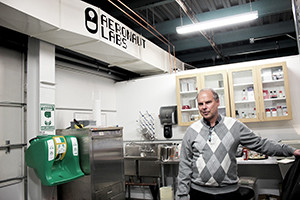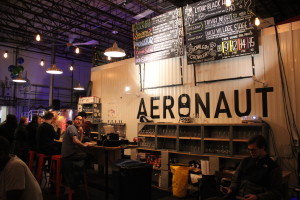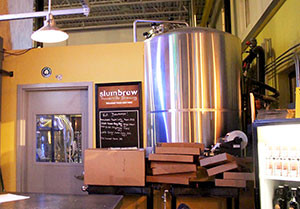By Margaux Maxwell

Randy Winchester, of Aeronaut Labs.
Randy Winchester, 60, sits in Somerville’s Aeronaut Brewing Company drinking a cocoa sutra, a beer brewed with cocoa nibs and one of the brewery’s best sellers. Winchester, who has helped develop the ever-expanding 115 beer recipes that have come out of the “Aeronaut lab” says, “Craft beer is beer, but really good beer. It’s an exploration of all the different flavor possibilities instead of just brands.”
The well-developed craft brew market in Southern California and Portland, Oregon is making its way into Somerville, Massachusetts. The trend follows a centuries old European tradition that has skyrocketed in the United States since the 1970’s alongside the slow foods movement, turning people away from the globalizing food economy that provides only one style of mass-produced beer or foods.
“When we started the brewing, craft beer was only 9 percent of the beer made in the U.S. In 48 months, that number increased to 11 percent,” says Caitlin Jewell, 43, co-founder of the Somerville Brewing Company.
 Although Somerville has long boasted basement brew operations and home brewing clubs, Aeronaut Brewing Company and Somerville Brewing Company opened at their present locations in 2014, making them the first craft breweries in to open in the city. The two have pioneered the movement, often so popular they have a difficult time getting beers out of their taproom and onto store shelves.
Although Somerville has long boasted basement brew operations and home brewing clubs, Aeronaut Brewing Company and Somerville Brewing Company opened at their present locations in 2014, making them the first craft breweries in to open in the city. The two have pioneered the movement, often so popular they have a difficult time getting beers out of their taproom and onto store shelves.
“We sold out of five types of beer over the weekend,” says Winchester.
Both make their beers in-house and source their hops and grains from local farmers. Aeronaut has gone so far as to grow their own yeast or gather wild strains. When it suits the style of beer, they look locally to build relationships within their community.
According to the Brewers Association located in Boulder, Colorado, the craft brewery is defined as small, independent and traditional. This means 6 million barrels of beer or less are produced per year by the brewery and less than 25 percent of the craft brewery is managed or owned by a non-craft beer industry member. The style of fermentation and ingredients must be characterized as traditional and innovative.
Bart Watson, chief economist at the Brewers Association, says millennials are shifting the market dynamics of beer, “We’ve seen millennials in particular embrace craft. They are demanding fuller-flavored products, more variety, and there is increasing demand for beers from small and independent producers. With 4,100+ breweries, there’s a lot of variation in what they are offering as well as their story and business model,” says Bart Watson, chief economist at the Brewers Association.
Craft breweries like Aeronaut and Slumbrew only have the license to sell their own house-made beers in their taprooms. Aeronaut’s sparse selection of food due to rules along similar lines mean that it has become a community space. The 12,000 square foot facility features live music, bocci games, classes, lecture and trivia nights. The brewery boats ample table space for patrons to bring their own snacks and a board game from home or the game library while they chug back a couple of unique, delicious beers.

Slumbrew Brewery of Somerville.
Somerville Brewing Company, also known as “Slumbrew,” offers spent grain bread making classes, a beer making school, live music, and comedy shows. They interact with the local urban food community by making their grain available to urban chicken farmers. Table turning is not frequent here where beer drinkers stay for hours to enjoy the laid-back environment.
Somerville has been the Goldilocks zone for this trend. The area has seen drastic gentrification as neighboring Cambridge becomes less affordable and wealth moves into city, particularly since the 1985 red line MBTA extension.
“Nobody finds this place by accident. Somerville still has a lot of undeveloped parts. This building used to be a research center, so the rent was less expensive than it might have been in other areas,” says Jewell.
Locals have expressed mixed feelings about the phenomenon, both liking the new spaces that are updating the city but disliking the increased impossibility of living here.
“I’ve been to Aeronaut and Slumbrew and I like those places, but all I’m saying is watch the prices because gentrification makes it so that people who were born and raised here can’t afford to hang out here,” says local resident Josh Mason, 30.
Mneesha Gellman, Assistant Professor of Political Science at Emerson College in Boston, thinks the movement needs to address income inequality.
“The middle class has enough stuff, and now the new market is for experience. The slow foods movement has tapped into that. Craft beer has moved out of people’s basements and into a brewery that provides a full range of experience of local consumption. In this context, people are given a feeling that ‘this is healthy and I’m doing a good thing.’ So the trend is paying for new experiences. Food is dramatically subsidized, so mass-produced beer consumers pay less. Craft breweries and other slow foods movement players argue that this is the real price of food, but people who are not making a living wage in their jobs feel differently,” says Gellman.
As the conversation around the slow foods movement and urban brewing develops, a new urban craft brewing company is emerging in Somerville. Winter Hill Brewery is set to open in at 328 Broadway Street this fall.














Reader Comments